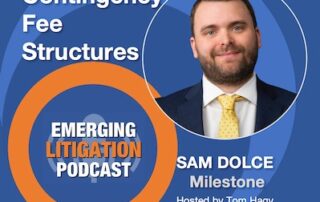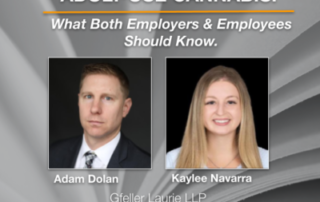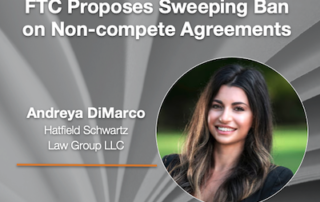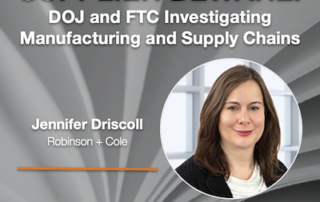Emerging Litigation Podcast
Litigation’s Role in Gun Safety Advocacy with Adam Skaggs
We’re closing in on 400 million guns in America, weapons that have been used to kill 1.5 million Americans between 1968 and 2017. Can litigation be an effective tool in curbing this loss of life? In 2020 alone there were more than 45,000 gun deaths. The beyond tragic and senseless mass shootings at schools has become all too routine. Most Americans want stricter gun laws which they believe will reduce the senseless killing in our country, which leads the world in both the number of privately owned firearms and gun-related deaths. The Supreme Court, of course, didn't take public opinion into account when it struck down a more than century old New York City ban on concealed firearms. Politicians do, however, pay close attention to polls. At the federal level, President Joe Biden signed a bipartisan law designed to make Americans safer in our gun-toting nation. Hailed as a "great start" and a rare but welcome exercise in reaching across the aisle, the law will result in safer citizens, but didn't include much of what gun advocates say is really needed to effect meaningful change. In California, Governor Gavin Newsom signed a new law that gives citizens incentives to pursue gun manufacturers and dealers who sell illegal firearms. In New York, Democratic leaders, undaunted by the Supreme Court, have pushed through new gun restrictions at vulnerable locations like schools, malls, and stadiums. But what can lawyers and lawsuits do about it? Plenty. What reasonable measurers can be put into place that will not infringe on Second Amendment rights? Several. Are we seeing litigation over these issues? You bet. For more specifics, listen to my interview with Adam Skaggs, chief counsel and policy director at leading gun safety advocacy group Giffords Law Center, co-founded by former Congresswoman Gabby Giffords. Prior to Giffords Law Center Adam was senior counsel at Everytown for [...]
High-Asset Divorce Litigation with Robert D. Boyd and Kimberli C. Withrow
High-Asset Divorce Litigation Let's assume this is good news. The divorce rate appears to be coming down. Either people are more committed to these unions or have succumbed to lifetimes of misery. But the common belief -- that "50% of all marriages end in divorce" -- doesn't enjoy statistical support. Six percent of people who divorce get back together, so that's something, too. According to Monster.com, the rate is higher among people working in fading industries, like certain machine operators. Despite frequent coverage of Hollywood breakups, they don't mention entertainers, other than dancers and choreographers, who don't fare well in marriage. Lawyers, in general, do not have a particularly high divorce rate. For insights into high-asset divorces, listen to my interview with Robert D. Boyd and Kimberli C. Withrow of Boyd Collar Nolen Tuggle & Roddenbery. Bob Boyd is a widely recognized leader in the practice of high-net-worth divorce litigation and contested custody cases. He is a former prosecutor and a U.S. Army Ranger and Paratrooper. Education: J.D., West Virginia University (Editor-in-Chief, West Virginia Law Review); B.A., United States Military Academy at West Point. Kimberli Withrow has 16 years’ experience representing clients in family law matters. She has served as trial counsel and hearings involving divorce, child custody, and child support matters. Education: J.D., Emory University School of Law; B.A., Duke University.Speaking of which, this podcast is the audio companion to the Journal on Emerging Issues in Litigation. The Journal is a collaborative project produced by HB Litigation Conferences and the Fastcase legal research family, which includes Full Court Press, Law Street Media, and Docket Alarm. The podcast itself is a joint effort between HB and our friends at Law Street Media. If you have comments or wish to participate in one our projects, or want to tell me how much you learned today – or if you’d like a copy of John’s and [...]
Attorney Fees and Settlement Funds with Sam Dolce
Our Guest As an attorney at Milestone, Sam Dolce provides in-depth, comprehensive consultations with attorneys about qualified settlement funds, fee deferral, and settlement planning. He also oversees the establishment of QSFs. Sam received a Bachelor of Arts in History from Macalester College, followed by a Juris Doctor from SUNY Buffalo Law School. He served as a participant in the New York State Pro Bono Scholar Program and has received multiple acknowledgements and awards for his dedication to pro bono service and social justice. As a subject matter expert, Sam is a regular speaker and presenter at academic and legal conferences regarding post-settlement strategies. Attorney Fees and Settlement Funds with Sam Dolce Uncle Sam has created a way for you keep more of your hard-won settlement or award, but there is much to consider and new information to weigh. When a contingency fee case reaches a verdict or settlement, it’s a big day for a plaintiff attorney. You have worked hard and shouldered litigation costs -- often for years without compensation -- to achieve the best outcome for your client. In this episode I get to speak with a financial management professional who specializes in advising trial attorneys how they can take full advantage of attorney fee structures. The concept of fee deferral arrangements may be familiar to you, but the landscape continues to evolve. My guest is Sam Dolce, an attorney with Milestone, a financial firm that optimizes settlement funds for trial attorneys and plaintiffs. Sam consults with legal professionals about about Qualified Settlement Funds, fee deferrals, and settlement planning. Sam received his B.A. from Macalester College and his J.D. from SUNY Buffalo Law School. Thanks to Sam for sharing his insights. On a previous episode you can hear Sam's colleague, Erin Waas, who heads up the Milestone Foundation, a non-profit organization that provides [...]
A Shameless Plug for Our Content Services
Your content marketing is everything you’ve ever dreamed of. Right?

Critical Legal Content was founded by Tom Hagy, former Editor & Publisher of Mealey’s Litigation Reports and VP at LexisNexis, founder of HB, current litigation podcaster and editor-in-chief. CLC’s mission is to help smaller firms and service providers not only create content — blogs, articles, papers, webinars, podcasts (like the stuff on this site) — but also to get it out there. How? Via social media, this website, your website, and potential via our podcast and journal which we publish in collaboration with vLex Fastcase and Law Street Media. The goal is to attract readers and dizzy them with your brilliance.
*Inspired by actual events.
Create content like a real legal publisher.
Emerging Litigation Journal
Potential Pitfalls with Adult-Use Cannabis: What Both Employers and Employees Should Know
The Authors Adam R. Dolan (adolan@gllawgroup.com) is a partner with Gfeller Laurie LLP, a tested litigator with a multifaceted practice, he has extensive experience handling catastrophic transportation, general liability, and products liability matters. He is a frequent writer and speaker on topics related to the cannabis industry. Kaylee E. Navarra (knavarra@gllawgroup.com) is an associate with Gfeller Laurie LLP where she works on matters involving commercial disputes, bad faith/ extracontractual liability, and insurance coverage. Interviews with leading attorneys and other subject matter experts on new twists in the law and how the law is responding to new twists in the world. Potential Pitfalls with Adult-Use Cannabis: What Both Employers and Employees Should Know "Employers may also take action when the employee, while working, manifests specific articulable symptoms of cannabis impairment that decrease or lessen the employee’s performance of the employee’s tasks or duties and/or the employee, while working, manifests specific articulable symptoms of cannabis impairment that interfere with the employer’s obligation to provide a safe and healthy workplace as required by state and federal workplace safety laws." Abstract: Recreational cannabis use for adults is legal in 21 states, having made its way eastward from Western jurisdictions that first addressed the issue. But these laws govern personal use during personal time. While they generally prohibit discrimination based on such use, these laws do not greenlight consumption at work or going to work under the influence. But with so many jurisdictions and job types, and variance among state laws, there aren’t simple answers. This is especially true for employers who conduct business nationwide, and because cannabis continues to be a Schedule I substance on the federal Controlled Substances Act. What rights and remedies do companies and workers have to resolve disputes? Are employers permitted to conduct drug tests? What about low-THC products and CBD? In this [...]
New Year, New Rules: FTC Proposes Sweeping Ban on Noncompete Agreements
The Author Andreya DiMarco (adimarco@hatfieldschwartzlaw.com) is counsel with Hatfield Schwartz Law Group LLC where she focuses on employment law and transactional matters. She has defended clients in state and federal courts and before administrative agencies, including the EEOC and DCR. Interviews with leading attorneys and other subject matter experts on new twists in the law and how the law is responding to new twists in the world. New Year, New Rules: FTC Proposes Sweeping Ban on Noncompetes "This is the FTC’s first attempt to ban non-compete agreements and strong opposition to the Proposed Rule as well as challenges regarding the scope of the FTC’s rule-making authority are likely to arise especially given the tremendous impact a retroactive and absolute non-compete ban would have. .... [P]otential litigation over the FTC’s authority to issue and enforce such a rule may cause further delays.... Moreover, the Proposed Rule is full of ambiguity which will likely be challenged." Abstract: On January 5, 2023, the Federal Trade Commission published a Notice of Proposed Rulemaking that would ban the use of noncompete agreements between employers and workers and would create an affirmative obligation for employers to void existing noncompete agreements. The Proposed Rule would also prohibit contractual clauses in other agreements or employment policies that have a similar effect. The Proposed Rule applies categorically to all workers, including independent contractors, without regard to a worker’s earnings or job function. This article discusses the nuances of the Proposed Rule as well as the legal and practical impact it will have if it is adopted. Download the article now!
Supplier Beware: The DOJ & FTC Investigating Manufacturing & Supply Chains
The Author Jennifer M. Driscoll (jdriscoll@rc.com) is counsel with Robinson+Cole in New York where she focuses on investigations, litigation, arbitration, mergers, and counseling. She has extensive experience in the medical devices, pharmaceuticals, electronics, and automotive industries. Interviews with leading attorneys and other subject matter experts on new twists in the law and how the law is responding to new twists in the world. Supplier Beware: DOJ & FTC Investigating Manufacturing & Supply Chain Issues “Although competitors may attend trade association meetings, the company representative in attendance should be well versed on the line between lawful discussions and ruses to disguise unlawful collusion in violation of the Sherman Act.” Abstract: Challenged by the pandemic, the global supply chain has generated a heightened amount of scrutiny for its impact on the economy, the labor market, the delivery of goods and services, and national security. Attention from the Biden administration portends an era when the federal government will shine a spotlight on the supply chain to root out misconduct. In this article, the author reviews recent supply chain disruptions and reactions from the DOJ and FTC, as well as the government’s efforts to support competition in the labor markets by eliminating noncompete agreements in employment contracts. Finally, she discusses proactive steps companies can take to mitigate the risk that they will find themselves the subject of a government investigation. Download the article now!









